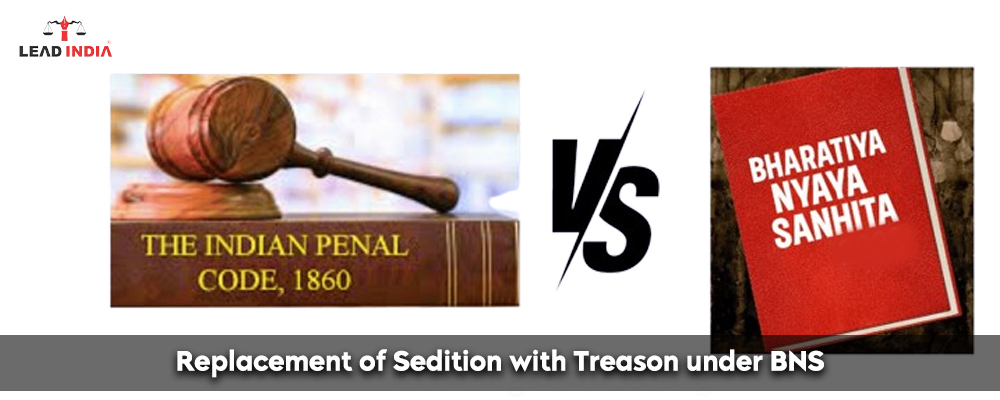One of the hallmarks of colonialism is the permanent and continuous growth of the State’s policing powers over its subjects. The new criminal rules do little to shift away from the colonial mindset of an all-powerful state. Rather, they intensify the power dynamic between the state and the citizens by strengthening police powers and establishing procedures for weakly defined but harshly penalized violations. In this sense, probably the most prominent residue of coloniality in our criminal laws is the IPC’s ‘Offences Against the State’ chapter, which includes the charge of sedition under Section 124A.
Need A Legal Advice
The internet is not a lawyer and neither are you. Talk to a real lawyer about your legal issue

Sedition with Treason under BNS
While the chapter remains essentially identical in the BNS,’sedition’ has been replaced by a new offense, defined in Section 152 of the BNS, named ‘Act endangering sovereignty, unity, and integrity of India’, which differs in some ways from its counterpart in the IPC. Section 124A of the IPC criminalizes activities that incite hatred, contempt, or disaffection towards the government, whereas Section 152 of the BNS criminalizes activities that incite’subversive activities’, encourage ‘feelings of separatist activities’, or endanger India’s sovereignty or integrity. While the term’sedition’ has been deleted from the penal legislation, the new clause looks to be just as rights-restrictive as its predecessor.
Furthermore, when compared to Explanation (2) of Section 124A, IPC, the explanation of Section 150, BNS Bill 2023, appears incomplete, because the entire term ‘does not constitute an offense’ is missing from Section 150. It needs to be more explanatory, ensuring that Section 150 does not restrict free expression or the press.
Section 124A imposed a fee on those who committed anti-national crimes, but currently Section 150 offers severe punishment from seven years to life imprisonment with a fine, which is an unavoidable move to prohibit anti-national activities.
Section 150’s ‘Explanation’ retains the old clarification, stating that comments expressing disapproval of the measures, or administrative or other action of the Government, with the intent to obtain their alteration by lawful means without exciting or attempting to excite the activities referred to in this section, will not constitute an offense under this provision.
Analysis of Treason under BNS
- The goal of injury is vague: Cl. 150 differs significantly from the IPC in that there is no obvious object of protection. The IPC requires inciting disaffection, hostility, or contempt for ‘the Government constituted by law in India’, whereas Cl. 150 specifies harming ‘India’s sovereignty, or unity and integrity’. The former lends itself to conceptualizing the government as a distinct and separate body, whilst the latter broadens the scope of offense because the nation is a necessary abstract term and does not lend itself to specificity.
- Criminalising dissidents: The Supreme Court in Kedar Nath emphasized the distinction between disloyalty to the government and robust criticism of its actions. The Court held that the Constitution’s freedom of speech and expression (Article 19(1) (a)) encompasses criticism or comment against the government and its policies in the strongest terms imaginable. The enlargement of the spirit of sedition in Cl. 150 generalizes a provision intended to apply in extraordinary situations and broadens its scope beyond that of s. 124A, as established by judicial decisions. This may raise issues about the law’s ability to carry out its intended goal of distinguishing between sedition and dissent.
- A lower threshold of injury: Another worry addressed by Cl. 150 is the status of protections that were judicially included in the concept of sedition. The ambiguous phrasing of Section 124A, particularly the use of the words ‘hatred’, ‘contempt’, and ‘disaffection’, necessitated the necessity for the protections. While Cl. 150 may appear to be a step towards clarity, before commenting, it is crucial to understand the judicial evolution of protections about the charge of sedition.
- Mens Rea: It must be assessed if the men’s rea requirement in Cl. 150, which uses the wording ‘purposely or knowingly’, is an improvement above s. 124A IPC. It would be incorrect to claim that section 124A did not contain a mens rea requirement. Even though the provision does not mention the words intention or knowledge (or any derivatives thereof), section 124A cannot be considered a strict liability violation.
Lead India provides free legal advice, internet information, and other legal services. We offer a forum where you may talk with a lawyer and ask legal questions. Lead India’s Lawyers may assist you with any legal matters. Lead India’s solicitors can help you with any legal concerns. Lead India also offers free online legal help in India. In addition to providing online legal aid, Lead India allows users to ask specialist inquiries for free.





 Talk to a Lawyer
Talk to a Lawyer